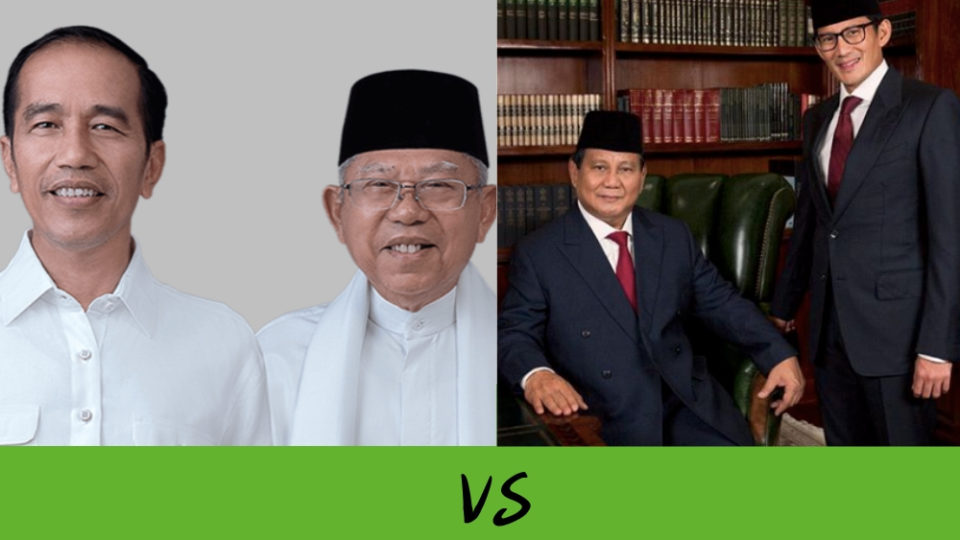Tomorrow is finally the big day — nearly 193 million Indonesian voters will have their chance to go to the polls and choose the country’s next president. But while the last two weeks of “spirited” campaigning by challenger Prabowo Subianto, as well as some outlier polls, have suggested the race has been tightening towards the end, the vast majority of reliable polls are still predicting the same thing they have predicted since late last year — a big win for the incumbent, President Joko Widodo.
Here are four of the latest poll results that were released over the weekend:
Indo Barometer
April 5-11
Jokowi-Ma’ruf: 59.9%
Prabowo-Sandiaga: 40.1%
Survei Indopol
April 5-11
Jokowi-Ma’ruf: 59.9%
Prabowo-Sandiaga: 24%
Undecided/No answer: 27%
Charta Politika,
April 5-10
Jokowi-Ma’ruf: 55.7%
Prabowo-Sandiaga: 38.8%
Median
March 30 – April 7
Jokowi-Ma’ruf: 47.2%
Prabowo-Sandiaga: 39.5%
Undecided/No answer: 12.3%
And here are four more of the most recent polls:
Saiful Mujani Research and Consulting (SMRC)
April 5-8
Jokowi-Ma’ruf: 56.8%
Prabowo-Sandiaga: 37%
Cyrus Network
March 28 – April 3
Jokowi-Ma’ruf: 56.4%
Prabowo-Sandiaga: 38.1%
New Indonesia Research & Consulting
March 18- April 1
Jokowi-Ma’ruf: 57.3%
Prabowo-Sandiaga: 35.9%
VoxPol Research and Consulting
March 18 – April 1
Jokowi-Ma’ruf: 48.8%
Prabowo-Sandiaga: 43.3%
In six of those eight polls, Jokowi-Ma’ruf has a lead of over 15% (much higher in some cases). In the case of the two outliers, Median and VoxPol, Jokowi still has a lead of 7.7% and 5.5%, respectively, which is far closer than the others but still puts a Prabowo outside of their reported margins of error and thus out of the realm of statistical probability.
So, according to the polls, Prabowo has almost no shot at winning tomorrow. But can we believe the polls?
In a recently published piece for New Mandala, Seth Soderborg, a PhD candidate at Harvard studying electoral institutions in Indonesia, says his research shows that pollsters in Indonesia “… have been able to accurately measure support for presidential candidates” (although he argues that they don’t always do as good a job at the legislative level, predicting “The only likely divergence from polls on election day will be the strong overperformance by most—perhaps even all—Islamic parties”).
Adi Prayitno, a political analyst at Universitas Islam Negeri (UIN) Syarif Hidayatullah , also predicted a result in line with the polls, especially those conducted by the more consistent and reliable polling institutions.
“If you look at the survey trends, Jokowi is still far in the lead. In the survey results, there has been almost no significant movement in Jokowi’s electability, especially from surveys issued by institutions that regularly conduct them, not survey institutions that only appear once every five years,” Adi said yesterday as quoted by Okezone.
There have been suggestions that enthusiasm for President Jokowi has dampened among many of his supporters, leading to numerous articles about voters planning to golput (not vote for either candidate) as a form of protest and a potential election spoiler
However, last weekend’s the surprisingly high levels of voter turnout among overseas Indonesians (the vast majority of whom were Jokowi supporters) casting their ballots at polling stations abroad suggests that enthusiasm about the incumbent remains high.
We’re not brave enough to make any of our own predictions quite yet, but we won’t have to wait to find out if the pollsters and experts got it right or wrong this time — the election quick counts are set to be released by 3 pm tomorrow, so there’s a good chance we’ll know who the next president of Indonesia will be by tomorrow afternoon.
Check out our Twitter account tomorrow where we’ll be live-tweeting the latest election updates!




